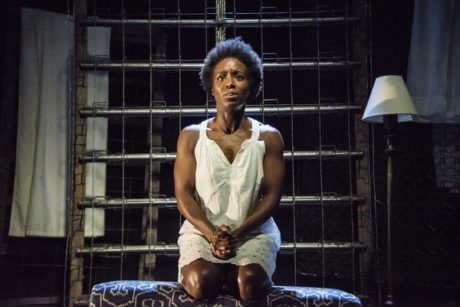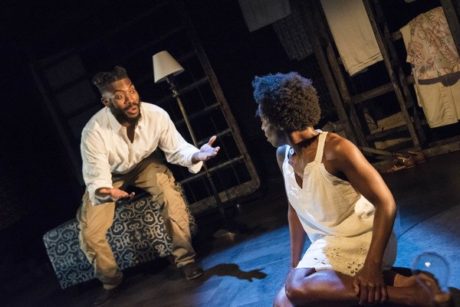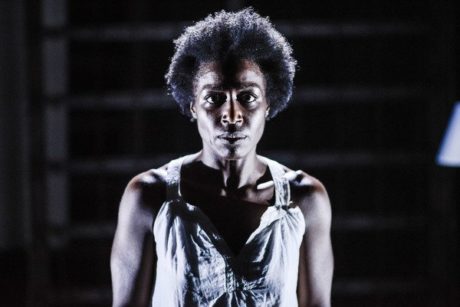Post-Play Palaver is an occasional series of conversations between DC Theater Arts writers who saw the same performance, got really into talking about it, and decided to continue their exchange in writing. That’s what happened when Senior Writers and Columnists Sophia Howes (Dangereuse) and John Stoltenberg (Magic Time!) saw the play Lela & Co. presented by Factory 449 at The Anacostia Arts Center.

Sophia Howes: In Lela & Co., Felicia Curry brings us a portrait of a female soul in torment who miraculously retains her courage and sensitivity in the midst of shockingly brutal circumstances. She is, happily, supported by an admirable acting partner, Renaldo McClinton, who plays her father, husband, and various other men in her life. The play, by Cordelia Lynn, is structured as an autobiography, and every moment of it is full of excruciating truth. As an abuse survivor myself, I thought I might find it disturbing. But like all successful pieces of art, it is a joy to experience.
John Stoltenberg: Interesting that you call Lela & Co. an autobiography. Though it is not the playwright’s own life story (she has called it fiction), in Felicia Curry’s breathtaking performance we believe it is definitely Lela’s life story. The play is mostly her monologue (various men in her life, all played by McClinton, make brief intrusions). Her performance captivated me from the first two minutes and thereafter only became more compelling.
Immediately we come to know Lela as a real girl (15 when the play begins), and then we stay connected to her through the marriage and anguishing abuse—captivity, rape, sex slavery—that happens to her and the dramatic escape she makes. The writer and the actor together make the character and the narrative as credible as one can imagine being played on stage. Curry’s moment-to-moment authenticity is simply awesome to behold. And there is a sense that as excruciating as Lela’s story is to hear, there is something transformative and transcendent in the way Lynn and Curry have honored it with honest truth-telling. And so yes, the final effect is freeing.
I was particularly impressed with the way the writer, director, and actor handled the violence in the story. None of it ever happens to the actor directly, but it is all made vivid in our minds. At one point there is an extended blackout during which we hear Lela say what her husband-then-pimp began to do to her. We see it only in our mind’s eye, which in a way makes us feel it all the more. It was one of the most powerful scenes in one of the most powerful plays about sexual abuse I can recall seeing.
Sophia: John, you are so right about that blackout. It was sensational. I want to draw attention also to the political aspects of the piece. When Lela is imprisoned in her own home (in a room, actually) by her husband, she can only hear the occasional sounds of gunfire. When she is able to get a glimpse of the horrors of war, we learn just enough detail to empathize with her pain. Lela is struggling not only with family abuse but with a country (unnamed) that seems to be essentially a failed state. Her new husband’s friends don’t like the country she comes from, and they make that abundantly clear. Everything is stacked against her, and yet she is radiant.

John: This is the second Factory 449 production I’ve seen directed by Hammerly that deals graphically and explicitly with a female’s resistance to, and escape from, torture. The other was Closet Land, also harrowing in its details, also set in an unspecified place. In my column about that show I wrote:
Director Rick Hammerly and Actors Sara Barker and David Lamont Wilson tell a hellish story and don’t hold back. A politically naive children’s-book author (Barker) has been detained by some unspecified government and is interrogated by a smooth-operator sadist-for-the-state (Wilson), who accuses her of having written books that subliminally indoctrinate impressionable youth….
Not only is Factory 449’s Closet Land a don’t-miss encounter with two exquisite performances in a stunning production. It is a revelation of liberatory meaning.
Thinking back to the similarities between Lela & Co. and Closet Land, what impresses me now is how precise and lucid is Hammerly’s direction, and how faithful it is to the female character’s physical and emotional state—literally breath to breath and heartbeat to heartbeat—without ever seeming exploitative or prurient.
Now, I know Hammerly is a director with great range. He just did a children’s show at Adventure, and for Avant Bard he is currently directing Barker again in a comedy by Lauren Gunderson. But there’s something about the specific care, empathy, and deep respect for female experience in extremis that’s in evidence in Hammerly’s direction of Curry in Lela & Co. that feels to me really admirable and rare.

Sophia: Hammerly’s direction is superb, and he is blessed with exceptionally fine actors. I was especially impressed by the scene between Lela and the one customer who displayed any sort of human feeling. The scene in which they are at cross-purposes, speaking different languages, while she thinks he will help her and he is describing his mission to help “her” country, is heartrending One of the best examples I have seen of the anguish caused by retraumatization. Being turned down when finally summoning the courage to ask for help is one of the most crushing experiences a human being can have. Lela’s persistence is what leads to her recovery, but it also involves surviving failure.
The script seems pitch-perfect except in two respects, which is not to fault the production at all. First, there is a sort of vaudeville turn in the middle, entitled “Lela & Co.,” which seems out of place stylistically with the rest of the play. Secondly, some of Lela’s problems seemed to be resolved a bit prematurely; another flaw that rests in the writing. Still, as John noted above about Closet Land, Lela & Co. is a “must-see” production.
John: Lela & Co. is not only a “must-see”; it is a “won’t-forget.” The subject of the play is horrifically painful. The performances are terrifically truthful. The experience of watching it is an extraordinary encounter with a wounded heart through ennobling art.
Running Time: one hour and 40 minutes, with no intermission.
Lela & Co. plays through October 1, 2017, at the Anacostia Arts Center – 1231 Good Hope Road, S.E., in Washington, DC. For tickets, purchase them online.
LINK:
Review: ‘Lela & Co.’ by Factory 449 at The Anacostia Arts Center by Robert Michael Oliver





